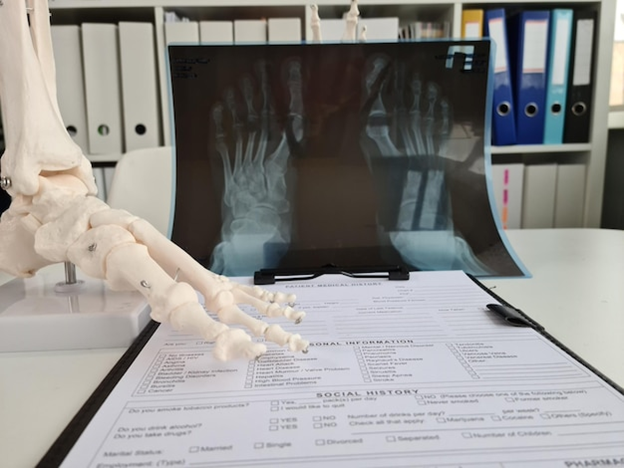Bone health has become a big concern for many individuals today. As people age, their bones can lose strength, becoming easier to break or fracture. Understanding bone density is important to keep us healthy. Increasing awareness has led to more interest in bone density tests as a preventive action. These tests are important in spotting possible bone problems early.

If you care about your bones, a bone density test can help you. It checks for osteoporosis and other conditions by measuring bone strength. If the test shows low density, it means your bones might easily fracture. Early detection allows starting needed steps quickly, such as changing habits or taking medicines to protect bones. That’s why bone density tests are vital in handling bone issues.
In this blog, we will talk about several important things concerning bone density. We’ll begin by explaining what bone density is and its importance. We’ll describe how a bone density test works, especially focusing on the DEXA scan. We’ll look at who should get tested, highlighting those most at risk. Next, we’ll show you how to read these test results clearly. By the end, you’ll know why these tests really matter for keeping bones healthy.
Understanding Bone Density and Its Importance
Bone density shows how much mineral is in your bones. It tells us about bone strength and helps predict fracture risks. We can find out our risk for osteoporosis with a bone density test.
As we grow older, our bone density naturally goes down. Women experience this more after menopause due to lower estrogen. Estrogen is important for keeping bones dense, so less estrogen means bones lose strength faster. Men lose bone density too, but it generally happens slower over time.
People often misunderstand bone health. Many think only women need bone tests, but men can have weak bones too. Also, those who think weak bones are an old person’s issue are mistaken. Bad diet and little exercise from early on harm bones too. These myths can be harmful if people don’t learn the truth about maintaining good bone health.
What is a Bone Density Test?
A bone density test lets you know how sturdy your bones are. It mainly helps spot issues like osteoporosis early to prevent breaks and fractures. The test is easy, doesn’t hurt, and focuses on bones like your spine or hip to see their density.

The DEXA scan is the go-to technique for checking bone density today. Known for its accuracy, this method is very precise in measuring bone strength. During the process, you lie comfortably as a machine moves above you, using low-level X-rays to take bone images.
Bone density tests are trustworthy and give a clear picture of bone health. They help doctors plan the right treatments for you. Plus, they’re safe, using just a small amount of radiation which makes them okay for repeated checks if needed.
How Bone Density Tests Work?
Lying on a comfy table, a scanner moves over you quietly. The scan takes less than half an hour and is all easy-going. No discomfort will occur during this step of the bone density test.
Doctors use central DEXA for bones in hips and spine, checking spots prone to fractures. It shows your bones’ full picture, detailed and clear. Peripheral DEXA checks smaller areas like the wrist and heel, helpful for quick looks. Though less detailed, it serves well for fast checks.
Radiation in these bone density tests is safe and very low. This should reassure anyone needing frequent checks to stay healthy. It’s less radiation than you’d see in your usual X-ray.
Who Needs a Bone Density Test?
Certain groups need bone density tests more than others. Postmenopausal women often see changes that affect their bone health. Older men also start to face bone issues as they grow older. People with conditions like rheumatoid arthritis or a family history of osteoporosis should get tested.
Many things can lead to lower bone density. If your family has a history of weak bones, you might too. Habits like smoking or drinking too much can harm your bones. Diets low in calcium or vitamin D aren’t good for bone health either. Sitting all day doesn’t help your bones get stronger.
Getting tested early can stop bigger problems later on. A bone density test finds issues before they become serious. It lets you act quickly to keep your bones strong and avoid fractures, keeping you active longer in life. You’ll want to look up “bone density test centres near me” to find local options for testing.
Reading Your Bone Density Test Results
The results from a bone density test come as a T-score, showing how your bones compare to a young adult’s bones. If your score is -1.0 or more, that’s usually seen as normal bone strength, while lower scores may mean attention is needed.
Bone strength falls into three broad categories: normal, low bone mass (also called osteopenia), and osteoporosis. When your T-score is between -1.0 and -2.5, it implies osteopenia, suggesting you should enhance your bone care. A score less than -2.5 signifies osteoporosis, showing the most serious bone strength loss.
Grasping what your score means aids when you chat with your healthcare expert. This dialogue helps get guidance that fits your health specifically. With your scores in hand, the doctor might propose lifestyle tweaks or medicine as needed.
Post-Test: Maintaining Strong Bones
Taking care of your bones is essential after your bone density test. Begin by focusing on changes to your diet and daily life to promote strong bones. Eating foods rich in calcium and vitamin D, like dairy, leafy greens, and fish, supports bone health significantly. Also, incorporating regular activities like walking, jogging, or dancing helps strengthen bones by bearing weight.
Let’s improve bone health with these suggestions:
- Maintain a nutritious diet filled with calcium and vitamin D.
- Add weight-focused exercises to your routine every week.
- Quit smoking and reduce how much alcohol you drink.
These simple changes can have a noticeable impact on maintaining bones.
In some cases, lifestyle shifts may not suffice alone. In such instances, medications or supplements can be supportive. A doctor might suggest medications like bisphosphonates to slow down bone loss over time. Additionally, calcium and vitamin D supplements are useful for those lacking these nutrients in their diet.
Before starting with any medications or supplements, talk with your healthcare provider to find what suits your needs best.
Regular check-ups play an important role following your initial bone density test. Keeping a close eye on changes allows for early detection of potential issues. Talking with your doctor about the timing of future tests helps. Depending on risk factors, tests every two to three years help catch changes early enough. Your doctor knows the best schedule based on individual factors.
Consequences of Ignoring Bone Health
Ignoring your bones can lead to serious problems later on. Weak bones mean fractures even from small falls. For seniors, a mere stumble could break a hip. This seriously affects how they move and live each day. Regular bone density tests help keep these problems away.
When older folks have weak bones, it can really change their lives. Fractures take them to hospitals for long stays, affecting life a lot. When they can’t move well, it affects their mood and social life too. Regular check-ups make sure these problems don’t sneak up unexpectedly.
Catching bone issues early with bone density tests helps avoid bigger problems. Starting treatment early cuts down risks and keeps bones strong. It’s always better to stop bone loss before it happens. Stay on top of your health by doing this simple thing.
Common Misunderstandings About Bone Density Tests
Many think bone tests are just for older women, but anyone can benefit from a bone density test. Men and younger folks also need checking if they’re at risk. It’s important to talk to your doctor, who can advise you about testing.
Some worry the test will be painful, but rest assured, a bone density test does not hurt. You just lie back while the machine does its job without causing any discomfort, making the test quick and easy.
Finding bone issues soon makes a big difference in health. Early action can stop bones from getting worse over time. Doing bone density tests regularly helps you stay active and worry less about your bones.
When to Begin Screening Based on Age and Health Conditions
Guidelines suggest women begin bone checks at 65, men at 70. People with risks might need tests before these ages. Your doctor will guide based on your past health issues.
Certain conditions make bones weaker faster. Issues like rheumatoid arthritis or taking steroids need quicker checks. If you have these risks, talk to your doctor about getting a bone density test.
Family history matters a lot when checking bone health. If someone in your family has weak bones, tell your doctor. They might ask you to test early and help avoid future problems for you.
Remember, finding a place is easy; just search for “bone density test centres near me.” Staying ahead with tests can make a real difference.
Comparing Bone Density Tests to Other Medical Screenings
Bone density tests measure bone strength, not like blood tests. These tests can spot weak bones long before big problems come up.
Bone density test focuses on bone health alone, unlike other check-ups. It helps spot weak bones early, keeping them healthy for longer.
Doing a bone density test with blood tests and X-rays helps a lot. Bone tests check bones, while blood tests and X-rays check more parts. They together make sure you are all well checked.
Where to Get a Bone Density Test in India
In India, you can find many places for a bone density test. SLP Diagnostics is well-known for its trusted service and accurate reports.
When picking a center, think about the location and tech they use. Getting a nearby place with new machines is key for the right results.
Some centers give extra care to make patients comfortable. Friendly workers, cozy spots, and fast results matter a lot.
Promoting Bone Health: The Call to Action
Scheduling a bone density test is important for your bone health. Such tests help in recognizing and preventing problems early.
Early check-ups can help avoid serious bone issues. Routine bone density tests can prevent fractures by keeping your bones healthy.
Always ask your doctor for advice before making health choices. Their guidance ensures you need and understand the right bone density test.


